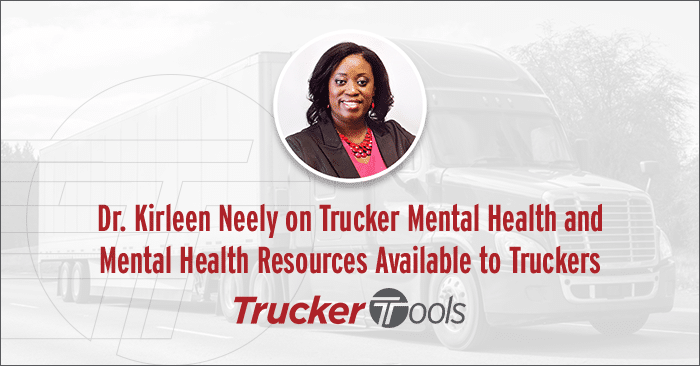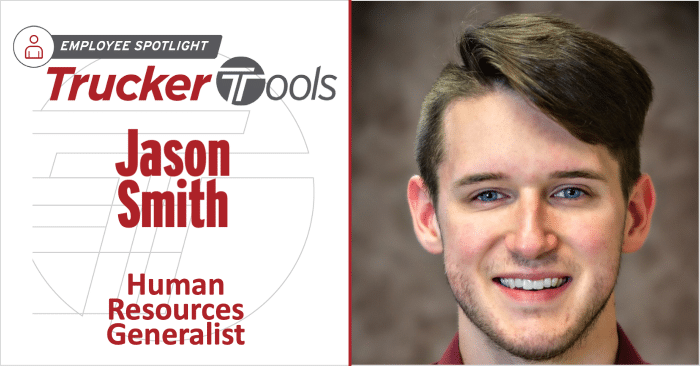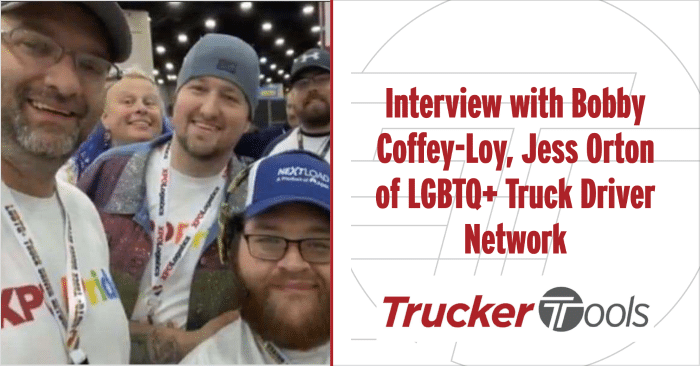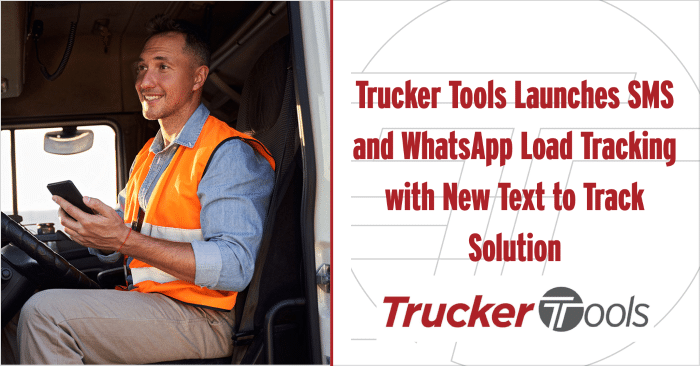September is National Suicide Prevention Awareness Month, a time to raise awareness about depression and suicide, and to have honest conversations about both. Though it’s not often talked about, the transportation industry has the fourth-highest suicide rate among working-age adults. Time away from home, isolation, stress, inadequate sleep, post-traumatic stress disorder, poor diet and other factors all can contribute to depression in truckers.
We recently interviewed Dr. Kirleen Neely, CEO of San Antonio-based Neely Behavioral Health and a licensed professional counselor who has been working in mental health for the last 20 plus years. We spoke to Dr. Neely to learn more about the unique challenges that truckers like you face and about the mental health resources that are available to you. Dr. Neely began working with truckers and carriers when her husband was employed in the trucking industry.
“My husband was gone a lot of time and so I was on the ground, experiencing all of the things that a trucker’s wife might experience in terms of the distance, trying to stay connected and trying to parent our two daughters,” Dr. Neely said in a recent interview with Trucker Tools. “We got really close with a lot of the truck drivers and came to understand the mental health challenges they’re dealing with. I told my husband, ‘We have to do something. We know too much to be silent.’”
“My husband was gone a lot of time and so I was on the ground, experiencing all of the things that a trucker’s wife might experience in terms of the distance, trying to stay connected and trying to parent our two daughters,” Dr. Neely said in a recent interview with Trucker Tools. “We got really close with a lot of the truck drivers and came to understand the mental health challenges they’re dealing with. I told my husband, ‘We have to do something. We know too much to be silent.’”
Based on their own experiences in the trucking industry, Dr. Neely and her husband started an Employee Assistance Program (a work-based intervention program designed to help employees resolve personal problems) specifically for logistics companies and truckers. Today, Dr. Neely and her clinical team provide counseling services to truckers and logistics professionals across the country through EAPs and individual counseling sessions.
Truckers: The Invisible Soldiers on the Front Line
According to Dr. Neely, truckers and others working in transportation face many challenges, chief among them is being away from friends, family and resources. As a trucker, it can be difficult to take care of yourself physically when you’re on the road. You may struggle with access to healthy food or not have much time to exercise, or you may not be able to make time for and schedule something as simple as a dentist appointment. Long periods of isolation and the trauma of witnessing accidents on the road can make truckers more susceptible to depression and anxiety, as well.
“There are so many industries that have stressful positions where everybody is throwing resources toward workers,” said Dr. Neely. “When I started working with truckers, I realized that it’s like they’re like invisible soldiers. They’re on the frontline, they’re getting wounds and battle wounds, and all these things are happening, but yet they are almost discarded. I think that really kind of made me even more passionate about working with truckers.”
“There are so many industries that have stressful positions where everybody is throwing resources toward workers,” said Dr. Neely. “When I started working with truckers, I realized that it’s like they’re like invisible soldiers. They’re on the frontline, they’re getting wounds and battle wounds, and all these things are happening, but yet they are almost discarded. I think that really kind of made me even more passionate about working with truckers.”
Maintaining Good Mental Health on the Road
“What I always tell people is don’t take the all or nothing approach,” Dr. Neely shared. “When you can’t get to the right foods, can’t get to exercise or can’t get to the doctor, you may just think you can’t do any of it and that you don’t have any options. Something is better than nothing. It’s ok if it’s a small thing that you do, such as trying to eat a little more fruit every day, drink more water at your next stop or walk around the building just one time. You may not be able to do it all, but if you make small gains, it helps. Also, reach out to your family members. If somebody can ride with you occasionally, let that happen. Don’t underestimate that isolation. You may like the isolation sometimes, but it weighs on you, so don’t have that all or nothing mentality and stay connected as much as you can.”
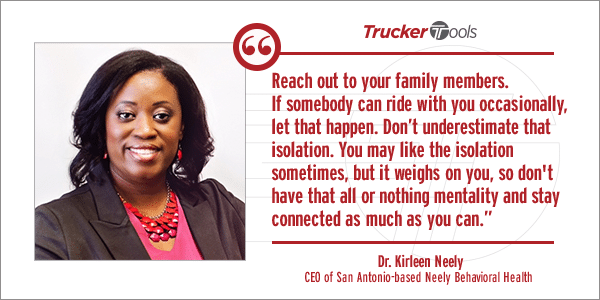
Dr. Neely shared that isolation is directly correlated with depression, anxiety and suicidal ideation. When you’re alone and start thinking, “Nobody will miss me” or “The world is better without me,” you don’t have anybody else there to counter those ideas. When you’re around other people and say something like that, a friend or loved one may grab you and say, “Man, I love you. I would be devastated without you.” Dr. Neely stressed that telling your kids, wife, husband or other loved one that you love and miss them is important, as well. She encourages everyone (not just truckers) to have those deeper conversations and express those unspoken feelings, as doing so can help you feel more connected and less isolated.
Where To Turn for Help
“Most counselors are doing virtual therapy and you can do that in your cab,” advised Dr. Neely. “You don’t have to wait until you’re at a stop or until you’re back home. You can do therapy online everywhere. If you have chronic severe depression or anxiety, the best form of treatment is probably going to be a combination of medication and therapy. What the research shows over and over again is that medication is a band aid if you do not do the therapy. However, a lot of people who come in just need to talk to somebody. Our first line of defense is never to put you right on medication. There are so many different types of therapies that we can do to decrease that depression, decrease that anxiety, especially when paired with physical activity and some other things.”
Dr. Neely also said that there are many online platforms and Facebook groups for truckers who have depression, too. If those types of resources work for you, embrace them. Someone may post something that just keeps you going for the day. If you work for a carrier or broker, you may be able to access a number of free therapy sessions through the company’s Employee Assistance Program. Another resource for truckers and their families is the National Association of Mental Illness (NAMI), which offers a free crisis hotline and other mental health resources throughout the United States.
“I’m also an adjunct professor at Saint Mary’s University in the San Antonio area and I can tell you that, no matter where you’re at, if a university has a graduate school program in mental health, they’re going to have a center where those graduate students provide free counseling,” said Dr. Neely. ‘It’s a great service and it’s usually free or usually low cost.”
“I’m also an adjunct professor at Saint Mary’s University in the San Antonio area and I can tell you that, no matter where you’re at, if a university has a graduate school program in mental health, they’re going to have a center where those graduate students provide free counseling,” said Dr. Neely. ‘It’s a great service and it’s usually free or usually low cost.”
To learn more about Dr. Neely and the services she offers, visit https://neelycounseling.com.
If you’re in crisis, call the NAMI Helpline at 1-800-950-NAMI or text “NAMI” to 741741.
